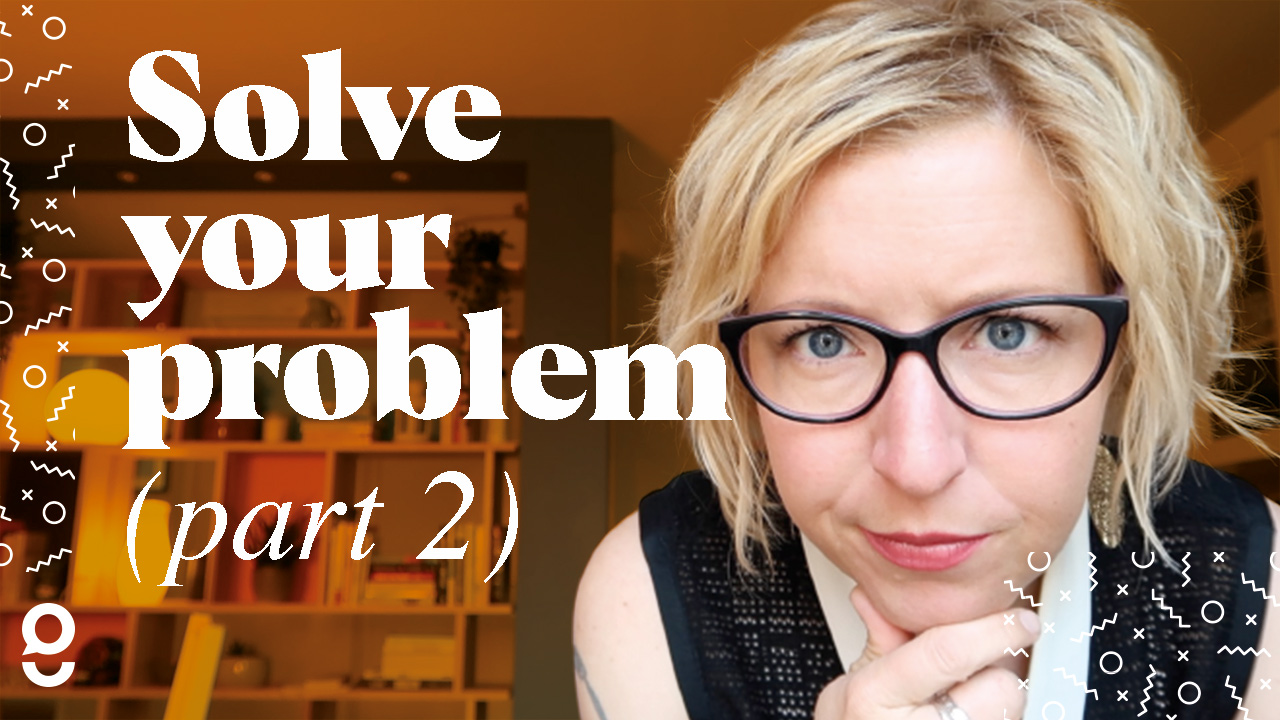
Problems–we all have them!
What makes you great in business is your ability to manage problems and find new solutions.
In today’s lesson, we’ll talk about 3 important problem-solving skills and learn Business English expressions you need to talk about them with your team.
Last week, we learned expressions for helping your team solve interesting problems–in English by understanding your problem and believing in your ability to solve it!
If you missed that lesson, you can check out part one of the series here.
We also began to solve one problem together…it’s a problem a lot of people who watch my videos share:
For more complex business situations, you need more advanced English…but how do you get it???
Why don’t we get back to tackling (solving) that problem together?
Get the worksheet to test what you learn in this lesson!
Did you know that I’ve made a worksheet to go with this lesson so that you can practice everything you see here today? I want you to make this part of the English you actually use in real life!
GET THE WORKSHEET: Make sure you practice these expressions so you can use them in real life with this worksheet made for you by a Neurolanguage coach.
Index:
1. Solve your problem #1 make your brain part of the solution!
2. Solve your problem #2 make it social!
3. Solve your problem #3 know when to bring in an expert!
1. Solve your problem #1 make your brain part of the solution!
A lot of problems we face that are difficult to solve are last-mile problems: problems we know how to solve…but don’t!
What makes us travel 999 miles and…stop before we make it to the solution?
Our brains!
In today’s video lesson, I’ve shared a clip by is Sendhil Mullainathan, a behavioral economist in a great TED talk on last-mile problems. In the clip, he’s talking about the brain–yours and mine! And reminding us: we need to remember how brain works when we’re solving important problems!
Here’s what he has to say:
“Alright, what’s the problem? The problem is this little three-pound machine that’s behind your eyes and between your ears. This machine is really strange, and one of the consequences is that people are weird. They do lots of inconsistent things.”
Yes, you guessed it, the three-pound machine is…your brain. All of our brains.
In fact, some of our problems have solutions, but we get stuck because of…our brains. And the way we think.
So, how do you make your brain part of the solution to your complex problem–instead of part of the problem? In other words, how do we create strategies where our brains can help us…instead of hurting us?!?
Well, as a Neurolanguage coach, this is what I’m passionate about. A lot of people come to me having worked for a long time on their English. And the solutions exist, but…we don’t always pay attention to how our brains work.
I really enjoy helping people create great habits that help them work on their English a little bit every day so that they can improve their English a LOT over time.
How?
Start small:
Take a big problem, break it into smaller parts and work on those.
For example, I once had a client who wanted to be ‘perfect’ in his English. Wow! That is a big problem to solve. So I helped him focus on one thing that was a priority–in his case, he worried about job interviews in English. By making the problem smaller, we were able to work on it more effectively–and make a big difference in his life.
Form great habits:
Take a small step that’s easy to do and do it every day.
For example, if you want to improve at job interviews, you could work on a few things you know you’ll need to do in your interview–talk about yourself, explain what you do. You could record yourself talking about those topics every day for a week–as a new habit.
Or you could join a conversation group where you meet new people in English and where you have to explain talk about these almost every day–like the Faster Fluency Conversation Club.
Also check out my lesson: How you can speak more simply and sound more advanced in English.
2. Solve your problem #2 make it social!
Another step towards solving interesting and complex problems is using social accountability. That means knowing you are not alone. It means seeing how others are helping to solve the problem… and knowing others on your team will see if you make some progress…or not!
For example, if your goal is to improve your English, social accountability might look like this:
- You meet with your coach and show them what you practiced on your own between sessions.
- You meet with a group–like a conversation club and you’re ready to speak…because you practiced ahead of time.
GET THE WORKSHEET: Make sure you practice these expressions so you can use them in real life with this worksheet made for you by a Neurolanguage coach.
3. Solve your problem #3 know when to bring in an expert!
You have a lot of expertise in something–you don’t get to this point in your career without it!
But You can’t be an expert at everything! You may need to bring in an expert to help you solve a problem. That way you can keep doing what you do best, while someone else brings in new ideas and perspectives!
I definitely bring in an expert when it comes to my videos. I know what I want to say and how to speak…but I leave all technical work to our amazing editor, Daren!
When you bring in outside expertise to help you solve a complex problem, it allows you to align tasks with your competencies–meaning, you get to do the work you are most competent to do–while someone else brings in new ideas and perspectives to solve your specific problem.
Also check out my lesson: Learn these Business English expressions to motivate your team with praise [+worksheet]
Take the next step: Improve your English in the comments
The best way to become more confident using Business English is to practice!
Here’s your Confidence Challenge for this week:
- Can you think of a time when you hired an expert?
- How did it help you keep working on what you do best?
If you learned something from this lesson, please share it with your coworkers & friends. You can send your message to them in English for more practice!
Click here to share this article on LinkedIn
Click here to share this article on Facebook
Speak English more fluently & confidently…in just 12 weeks
My Private Lesson Program “Speak Business English Confidently” opens tomorrow.
It helps you feel comfortable speaking Business English in social & professional situations
It’s for you, if today, you feel:
- Uncomfortable in conversations in English, OR
- Embarrassed by your level of English, OR
- Tired of English being a problem for your career, OR
- Frustrated your English is not better, after years of study
And if you have a specific English problem…and a specific definition of success in you English and your business…this program is designed just for you.
If you sign up Thursday, March 24th, 2022… you can get a -100€ discount off the program + 6 other free gifts (Value: over 1000€) when you enroll in the program “Speak Business English Confidently.”
More details at https://mybusinessenglishcourses.com/speak-business-english-confidently/join-now
My team and I can’t wait to personally help you become more confident in English.
All the best,
Christina
More good stuff…
Click the image to learn more







